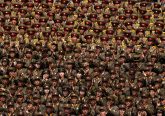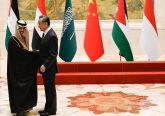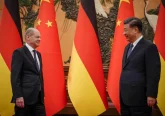 In the wake of the rather premature death of North Korean leader Kim Jong-il at the age of 69, North Korea is expected to enter a period of violent turmoil and power struggle. Kim’s heir apparent is his youngest son Kim Jung-un, who is perhaps too young in his twenties and too inexperienced in political and military affairs to receive natural respect from his fellow Koreans, particularly in the context of a socialist Confucian culture. In the expected battle royal, he will face a strong rival in his uncle Jang Seong-taek, whose wife is Kim Jong-il’s only sister and who has a strong link to the military leadership through his elder brothers (one of them, Jang Seong-U, was the commander in charge of defending Pyongyang – one of the most important posts in the North Korean military). Having served as an official in the Korean Workers’ Party (KWP) for decades, Jang also enjoys strong ties to Party cadres. Kim Jung-un’s eldest half-brother could be another rival, considering his close links to the Chinese leadership. He has lived in Macau and Hong Kong, apparently protected by the Chinese government against any probable conspiracy on his life planned by Kim Jung-un. On one occasion he was also found to have taken a flight with some top Chinese envoys on his way back to China. But a dark horse may well come out of the military, which has gained stronger ground in North Korea through Kim Jong-il’s ‘military first’ campaign aimed at excluding any possibility of collective leadership based on the Party.
In the wake of the rather premature death of North Korean leader Kim Jong-il at the age of 69, North Korea is expected to enter a period of violent turmoil and power struggle. Kim’s heir apparent is his youngest son Kim Jung-un, who is perhaps too young in his twenties and too inexperienced in political and military affairs to receive natural respect from his fellow Koreans, particularly in the context of a socialist Confucian culture. In the expected battle royal, he will face a strong rival in his uncle Jang Seong-taek, whose wife is Kim Jong-il’s only sister and who has a strong link to the military leadership through his elder brothers (one of them, Jang Seong-U, was the commander in charge of defending Pyongyang – one of the most important posts in the North Korean military). Having served as an official in the Korean Workers’ Party (KWP) for decades, Jang also enjoys strong ties to Party cadres. Kim Jung-un’s eldest half-brother could be another rival, considering his close links to the Chinese leadership. He has lived in Macau and Hong Kong, apparently protected by the Chinese government against any probable conspiracy on his life planned by Kim Jung-un. On one occasion he was also found to have taken a flight with some top Chinese envoys on his way back to China. But a dark horse may well come out of the military, which has gained stronger ground in North Korea through Kim Jong-il’s ‘military first’ campaign aimed at excluding any possibility of collective leadership based on the Party.
North Korea has been able to survive in the middle of an economic blockade and other hostile policies from the US and its allies by virtue of its lifeline to China. Beijing has traditionally regarded its Korean ally in terms of a ‘lips and teeth’ relationship. For the Chinese leadership, North Korea is the buffer zone between China and the US. China will continue to keep keen eyes on the situation in North Korea and make every effort to keep this failing country afloat. Accordingly, it will also keep sending messages to the US and South Korea to the effect that it wants North Korea alive as a buffer zone. And while the US might accept China’s position, South Korea and possibly the whole Korean nation could eventually stand up against this Chinese wish. Korean nationalism with its dream of reunifying Korea could sweep the peninsula, defying any cold calculation on the part of the great powers. It is therefore possible that in the future Korean nationalism might collide with China’s interest in keeping its buffer zone. If South Korea, the US and China will be stubborn and refuse diplomatic coordination, the Korean peninsula could see another military conflict on its soil.
Of course there is a brighter picture as well. The post-Kim North Korea may follow in the steps of China’s economic development experience, opening its doors to investment and trade from abroad. This may provide opportunities for South Korea and Japan, both of which are suffering from the domestic ‘under-consumption’ problem which is inherent in the investment-led East Asian development model. North Korea has filled in the gap between the name of republic and the reality of dynasty by fabricating and emphasizing its leader’s charisma. Now it is time for a new leader to change this charisma from a military and confrontational type to an economic and more conciliatory one. The North Korean leadership may even consider that after all it was rapid economic growth in South Korea and China that buttressed the dictatorships of General Park Chung Hee and of the Chinese Communist Party respectively.
Lastly, it is a strange coincidence that several power transitions are due in 2012 in all of the major powers concerned, and this will add to uncertainty in the East Asian region. China will see a change of leadership. While the head post of the Politburo Standing Committee is presumably going to be assigned to Xi Jinping, other important leadership positions are still open for fierce power struggles within the Chinese Communist Party. Russia will experience a deep conflict around the return of Vladimir Putin to the presidency. South Korea will hold another round of presidential elections. The US, another fundamental stakeholder in the East Asian region, will also be embroiled in a presidential election. Japan seems to have made it almost a rule to change prime minister annually. In such a situation, North Korea, with the least specified procedure of leadership change, will enter a power struggle of life and death. What will become of North Korea and beyond?
Don Q Kim is a doctoral candidate in East Asian Studies at the University of Cambridge, and a former North Korea desk officer at South Korea’s Ministry of Foreign Affairs and Trade. His research is currently focusing on Japanese imperialism in the 1920s.
Photography courtesy of the Russian Presidential Press and Information Office.







No Comment